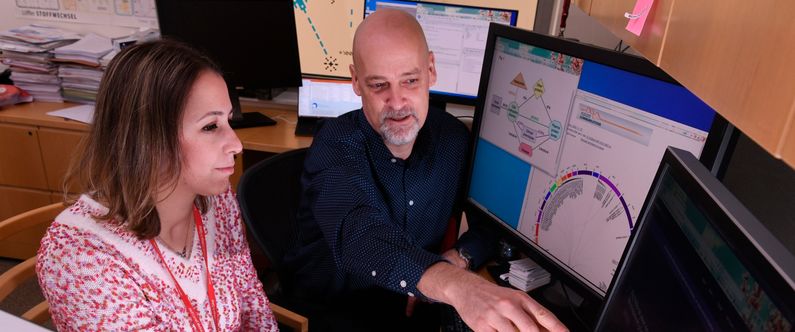WCM-Q research links proteins to diabetes
 Dr. Karsten Suhre and Dr. Shaza Zaghlool of WCM-Q.
Dr. Karsten Suhre and Dr. Shaza Zaghlool of WCM-Q.
Researchers at Weill Cornell Medicine-Qatar (WCM-Q) and the University of Iceland have identified a group of proteins that are involved in causing type 2 diabetes in humans.
Using advanced analysis techniques, the researchers measured over 4,000 different proteins in blood samples from more than 5,000 Icelandic individuals and identified 536 proteins that were associated with type 2 diabetes. They confirmed their findings with the results of the Qatar Metabolomics Study of Diabetes, a 2012 study of 374 human subjects conducted in Qatar by Hamad Medical Corporation and WCM-Q.
Following further analysis, the researchers determined that 15 proteins appear to have a causal role in the development of type 2 diabetes, while a further 23 proteins are markedly more prevalent in blood after the development of the condition. To support these findings, the study investigated how genetic predisposition for type 2 diabetes affects blood serum protein levels in the study participants.
Proteins that are shown to be causal for the disease provide targets for future research to develop new therapeutic drugs to treat or possibly prevent the onset of type 2 diabetes in at-risk groups. Furthermore, the discoveries of proteins that are changed by the disease open the potential for the development of new diagnostic tests to determine whether an individual is likely to develop type 2 diabetes or already has the condition.
WCM-Q Research Associate Dr. Shaza Zaghlool, a joint first author on the study, said: “This research has allowed us to identify a number of proteins that have very strong associations with type 2 diabetes, which is exciting because it helps us understand with greater clarity how the disease develops. It also means we have identified targets for further research that could eventually lead to new drug therapies for type 2 diabetes, which is highly prevalent in the Gulf region.”
Type 2 diabetes is a complex disorder that typically develops over a sustained period of time, with many normal metabolic processes becoming disrupted well before more conspicuous symptoms like excessive thirst and hunger, fatigue, frequent urination and blurred vision become apparent. As such, any test that can identify the disease in its early stages when interventions will have the most benefit are extremely important.
The research was based on samples of elderly Icelandic individuals and was conducted in collaboration with scientists at the University of Iceland in Reykjavik, the Icelandic Heart Association, GNF Novartis in San Diego, California, and the Novartis Institutes for Biomedical Research in Cambridge, Massachusetts. The study – titled “Circulating protein signatures and causal candidates for type 2 diabetes” – is being published in Diabetes, the journal of the American Diabetes Association.
WCM-Q has very significant capabilities in protein analysis, having established a core facility dedicated to proteomics (the study of proteins and their interactions) equipped with some of the world’s most advanced protein biomarker discovery tools, which can measure thousands of human proteins in a single blood sample. The researchers believe the primary data used in the study to be the largest protein dataset to be described to date in any diabetes research in terms of the number of proteins measured and human samples screened.
WCM-Q’s Dr. Karsten Suhre, one of the senior authors in the study, said: “The highly sophisticated protein analysis platforms WCM-Q has established here in Qatar gives it a huge capacity for analyzing proteins in large population and clinical studies to discover protein associations, not only with diabetes, but also many other diseases relevant to the country. This gives us the ability to take part in ground-breaking international studies such as this one, furthering our understanding of how type 2 diabetes develops and providing targets for future research into new medications.”
Dr. Khaled Machaca, senior associate dean for research, innovations, and commercialization at WCM-Q said: “For Qatar and the wider region, type 2 diabetes is perhaps the most pressing health concern that we face, with more people being diagnosed and at much earlier ages than previously. It is therefore great news that this international collaboration has found common protein markers between cohorts in Iceland and Qatar to help better understand the progression of this complex disease, especially in the context of the local Qatari population.”
The research was supported by the Biomedical Research Program at WCM-Q, a Qatar Foundation partner university. Dr. Suhre’s work is also supported by Qatar National Research Fund grant NPRP11C-0115-180010 to the Qatar Diabetes Prevention Program (QDPP), a cluster of research projects aiming to understand the disease in greater detail and pave the way for new treatments.
The paper can be read in full here.